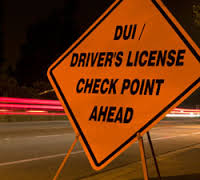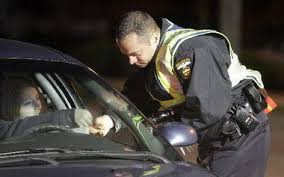
DUI Checkpoint Ahead
DUI Checkpoints, Your Rights and The Law
I have seen a lot of articles and videos recently regarding DUI checkpoints. I have been asked a lot of questions regarding checkpoints. People want to know their rights. What do they have to provide to the police? Do they have to roll down their window? I will get to the answer right away and then the analyze the issues.
The Answer under Florida Law:
“Moreover, as the state points out, a driver who is lawfully stopped for a DUI checkpoint is under a legal obligation to respond to an officer’s requests for certain information and documents, and the driver’s refusal to respond to these requests may constitute the misdemeanor offense of obstructing or opposing an officer. See § 843.02, Fla. Stat. (1991). See also Burkes v. State, 719 So.2d 29 (Fla. 2d DCA 1998); K.A.C. v. State, 707 So.2d 1175 (Fla. 3d DCA 1998); In the Interest of J.H., 559 So.2d 702 (Fla. 4th DCA 1990); M.C. v. State, 450 So.2d 336 (Fla. 5th DCA 1984). If a driver engages in obstructive conduct, in violation of section 843.02, then standard police detention and arrest procedures, rather than checkpoint guidelines, would govern the officer’s handling of the situation.” Rinaldo v. State, 787 So.2d 208 (Fla. App., 2001)
Issue 1: Cop Baiting | Don’t be Stupid
The vast majority of the checkpoint videos that I have recently seen on Youtube involve what I call “cop baiting.” “Cop baiting” is when an individual does something stupid with the intent on getting under the cops skin and then turning around and acting like a victim when the officer gets upset. Cop baiting is not the simple act of being disrespectful towards a police officer. Cop baiting is going out of your way to intentionally provoke a response from a police officer. I have no sympathy for anybody who intentionally provokes a response from a police officer whether it be foul language or a smack upside the head.
Most of the videos that I have seen involve individuals refusing to roll down their windows, refusing to provide their license and refusing to answer questions claiming that the checkpoint is somehow unconstitutional under the United States Constitution. I won’t post any of those videos here because I don’t want to spread their idiocy. Many people have been arrested and convicted of resisting an officer in the performance of his official duties, or similar statutes, by refusing to cooperate with officers at a DUI checkpoint. If you choose to resist or obstruct an officer at a checkpoint you will probably get arrested. When you do get arrested, you will have to post bail and hire an attorney. So your 1 minute of looking like an idiot on Youtube just cost you $5,000. It will cost you $5,000 even in the unlikely event that you beat the charge.
Issue 2: Checkpoints Are Permissible Under the United States Constitution
The United States Supreme Court case ruled that checkpoints are permissible under the 4th Amendment in Michigan Dept. State Police vs. Sitz in 1990. The Supreme Court, in a 6-3 vote, ruled that a state has a “substantial government interest” to stop drunk driving, and that checkpoints are rationally related to achieving the goal of stopping drunk driving. The Court also ruled that the impact on drivers from being stopped at a checkpoint was de minimus, that the time a motorist is delayed from reaching his or her destination is negligible, and that brief questioning in order to determine if there is “reasonable suspicion” that a driver is impaired also is not a significant impairment of the drivers’ Fourth Amendment right. The court balanced the interest of the state in combating drunk driving with the individuals Fourth Amendment rights and held that checkpoints were permissible.
There have been further cases which restrict how checkpoints can be conducted. In Brown v. Texas, 443 U.S. 47, 50, 99 S.Ct. 2637, 2640, 61 L.Ed.2d 357, 361(1979). The Supreme Court stated that the trial court must look to “(1) the gravity of the public concerns served by the seizure, (2) the degree to which the seizure advances the public interest, and (3) the severity of the interference with individual liberty.” Other cases that significantly modified how a checkpoint can be conducted are:
- Indianapolis v. Edmond, 531 U.S. 32, 40-42, 121 S. Ct 447, 148 L.Ed.2d 333, 343(2000);
- Ferguson v. City of Charleston, 532 U.S. 67, 81, 121 S.Ct. 1281, 1290, 149 L.Ed.2d 205, 218(2001);
- Illinois v. Lidster, 540 U.S. 419, 427, 124 S.Ct. 885, 890, 157 L.Ed.2d 843, 852(2004).
However, all of the foregoing cases involve how the checkpoints were setup and operated. This is information that your attorney will get after you are arrested.
Issue 3: State Laws can be More Restrictive
Ironically, when Michigan Dept. State Police vs. Sitz was remanded to the Michigan Supreme Court, the Michigan Supreme Court ruled that the Constitution for the State of Michigan provided additional protections for drivers than the United States Constitution. Consequently, the Michigan Supreme Court ruled that checkpoints were not permitted pursuant to the State Constitution rather than the United States Constitution.
The states are also free to implement legislation regarding checkpoints as long as the legislation more restrictive towards the state as opposed to attempting to overturn the Supreme Court by state legislation. In my opinion, a perfect example of this prohibited legislation is found in North Carolina Statute 20-16.3A(d). The statute states, “The placement of checkpoints should be random or statistically indicated, and agencies shall avoid placing checkpoints repeatedly in the same location or proximity. This subsection shall not be grounds for a motion to suppress or a defense to any offense arising out of the operation of a checking station.”
This legislation is designed to avoid motions to suppress based on an allegation that the checkpoint was not narrowly tailored to meet its objectives. I no longer practice law in North Carolina and can not give any legal advice regarding North Carolina law. However, it appears that one Judge agreed with me that the law was unconstitutional.
[gview file=”https://yourfloridacriminalattorney.com/wp-content/uploads/2014/09/Order-Granting-Motion-to-Suppress-DUI-Checkpoint.pdf” save=”1″]
So What Are My Rights? What do I do if I am Stopped at a Checkpoint?
Assuming that checkpoints are legal in your state, you must comply with the officer’s requests. For example, providing drivers license, registration and proof of insurance. The Sitz case makes it very clear that the officer’s have the right to ask you limited questions. As I wrote above “brief questioning in order to determine if there is ‘reasonable suspicion’ that a driver is impaired also is not a significant impairment of the drivers’ Fourth Amendment right.”
So they can ask, but you do not have to answer if your answer may incriminate yourself. You still have your 5th Amendment rights. If you haven’t been drinking or you aren’t coming back from a bar, simply tell them you are coming back from grocery shopping(tell the truth) and be on your way. If you feel that your answer may incriminate you, don’t answer. In some circumstances, they may let you go and in some they may arrest you on an obstruction charge or maybe a DUI. There is nothing you can do to help yourself at that point. Let your attorney handle it.
Most importantly, ROLL DOWN THE WINDOW! This seems to be all the trend on the cop baiting videos. The police officer cannot ask you questions with your window rolled up. If it is cracked the officer will claim he couldn’t hear you. Maybe you interfered with the states right to determine reasonable suspicion because he couldn’t tell if there was an odor of alcohol. Who knows what the police officer will say, but if you obstructed, you get arrested.
So do as follows:
- ROLL DOWN YOUR WINDOW so the officer can communicate with you;
- Be polite;
- Provide the police officer with your license, registration and insurance;
- If the answers won’t lead towards incriminating yourself, answer the questions and be on your way;
DO NOT DO AS FOLLOWS:
- Enter into a debate with the police officer over the constitutionality of checkpoints;
- Make any incriminating statements. If where you were or what you were doing had to do with anything that could be perceived as illegal, simply state “I am not going to answer any questions without a lawyer present.” You may get arrested anyways, but that is what attorneys are for.
- Do not take the roadside sobriety exercises. You are under no obligation to do so. Simply say “No thank you officer. I am not going to take any tests.”
- I don’t think that I am allowed to advise anybody NOT TO TAKE THE BREATHALYZER, if it is a second refusal or more, refusing to take the breath test is a criminal offense.
- If you are going to shut up, then shut up. The more you talk the more evidence the police will have;
- DO NOT GO ON COP BAITING EXPEDITIONS!
Fort Lauderdale DUI Attorney, Michael Dye, represents individuals charged with all types of felonies and misdemeanors including, but not limited to contempt of court. For more information, please contact Mr. Dye at his Fort Lauderdale or Miami office:
The Law Offices of Michael A. Dye, PA, 1 East Broward Boulevard #700, Fort Lauderdale, FL 33301 (954)990-0525 or
The Law Offices of Michael A. Dye, PA, 2 S Biscayne Blvd, Miami, FL 33131 (305)459-3286




